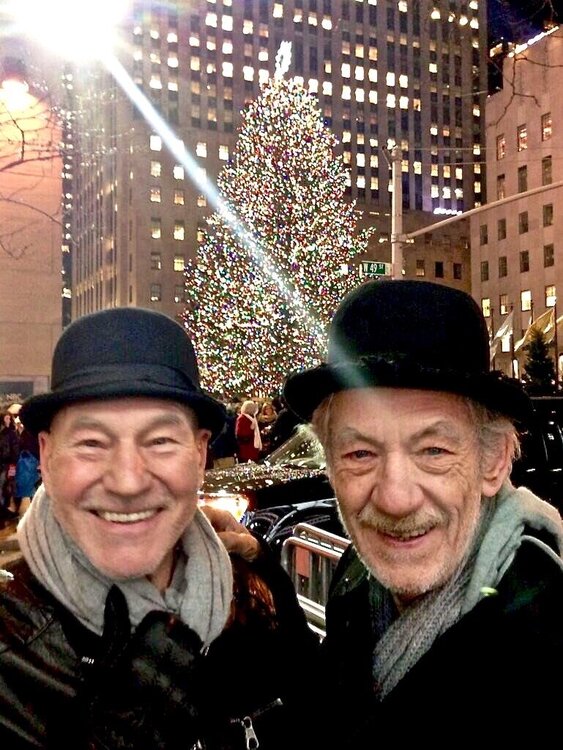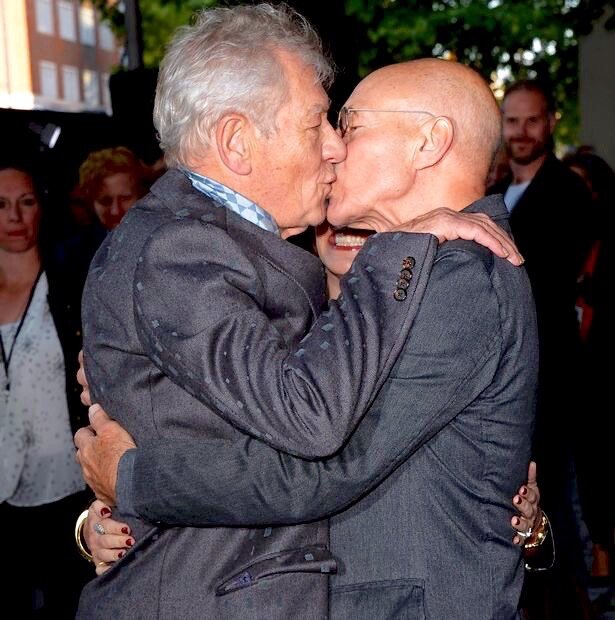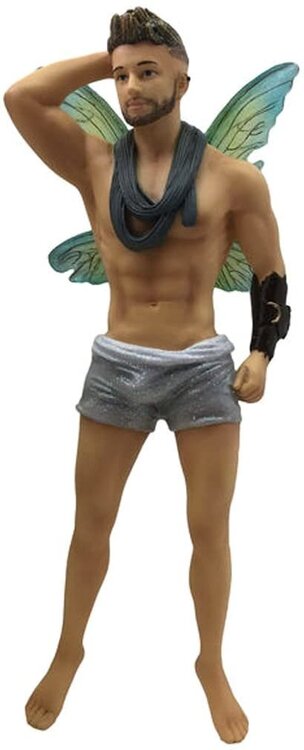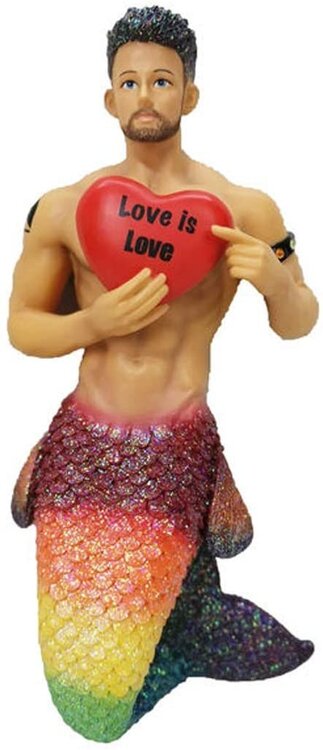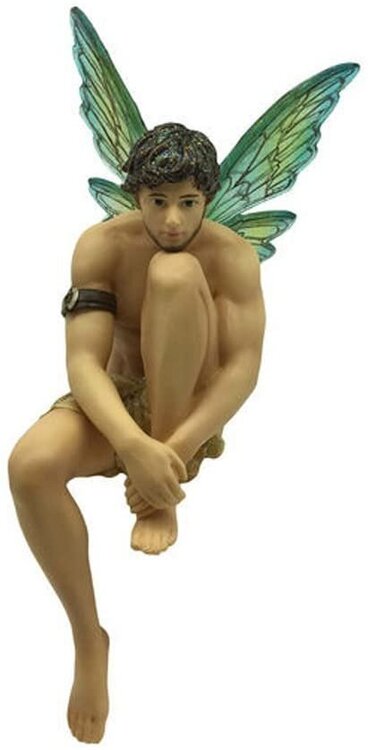Leaderboard
Popular Content
Showing content with the highest reputation on 07/15/2021 in all areas
-
Another in the occasional series of articles from a website I occasionally wrote for a few years ago. The others in the series are Plus ça change . . . Thoughts on the March of Time in this forum and Experiences of Asia (Gay-Related) to While Away These Difficult Times under Gay Asia. This one was sparked by an interview I saw on CNN. I always wonder: who will be next? CNN anchors coming out, I mean. Anderson Cooper had been the subject of rumours for years. Even then, it took some time before he came out on air. Now we know – too well, because it is far too often mentioned that he is a father, even though he is no longer partnered with the man with whom he had the baby. Don Lemon’s engagement to his fiancé is talked about quite a lot in the little dialogues – bromances – he has each time his weekday show abuts that of the non-gay Chris Cuomo. Then there is the channel’s travel/business guru, the goofy Richard Quest, a refugee from the more staid world of the BBC seemingly decades ago, and no doubt surprising to some a barrister who was called to the English bar (the legal one) in 1983. Quest’s coming out followed an interview he had with Lord John Browne, then the CEO of the oil giant BP. Browne, in the closet for 50 years, had been forced to come out after his much younger boyfriend spilled the beans. Browne then wrote a book about his secret life titled The Glass Closet. This tells the story of Browne’s brief double life and his 3-year relationship with a Brazilian he had met on an escort site, his first and only gay affair, even though he had known he was gay since leaving his boarding school. Threatened with exposure by a tabloid newspaper, he tried to get the story quashed. It did not work. Six months short of his 60th birthday he came out as a publicly gay man and has since become a gay activist. The evening following their interview, Quest admitted he had felt guilty discussing homosexuality with Browne. He then told the world that was because he himself is gay. Did anyone really think he could not be? A man who takes his teddy bear with him on all his overnight freebie flights around the world for his Travel Show? Quest had also been a naughty boy. In 2008 he was stopped going through Central Park after closing time. He was found with a stash of crystal meth, a rope around his neck tied to his genitals and a sex toy in the trunk of his car. The media had a field day but CNN supported him even though he has never explained why he was there and what he was doing. After six months they even gave him a new show. I mention all this because I think one of CNN’s great assets is now being underused. Christiane Amanpour is an excellent journalist and interviewer. She has been with the channel for over 25 years. She did leave for a short time in 2010 to join ABC News. This was not a marriage made in heaven. Her programme tanked big time and after little more than a year she left ABC and returned to CNN’s embrace. Her interviews are usually deep and interesting, bringing out a lot about the interviewee. I still recall an interview with actor Andrew Garfield about his appearance as the lead in the Broadway revival of the 2017 London National Theatre’s production of Tony Kushner’s stunning 1993 Pulitzer Prize-winning play about the AIDS crisis Angels in America.Kushner also took part in that interview. The point of this post is more about the importance of friendships no matter what’s one’s partnership state. Which brings me back to Ms. Amanpour. Only occasionally I feel she does go a bit overboard and gush too enthusiastically. Back in 2013 she interviewed two celebrated actor knights, Sir Ian McKellan and Sir Patrick Stewart. Both were in London to appear in Harold Pinter’s play “No Man’s Land” receiving stellar reviews. Four years earlier they had appeared on stage together in Berthold Brecht’s Waiting for Godot. It had taken those four years for them each to be free to appear together on stage again. Which is perhaps a little surprising given that these two acting greats are the best and closest of friends. Yet one is gay and proudly out. The other is totally heterosexual having married his third wife in 2013. The actors first met back in the 1970s when working at England’s Royal Shakespeare Company. McKellan by then was well known as one of the UK’s finest up-and-coming actors, almost certainly known to Stewart but not to the public as being gay. Stewart was little more than a jobbing actor with a wife and two young children. Before then it so happened I had seen McKellan during my student years. On a visit to Scotland, I was fortunate to catch a couple of plays being performed at the celebrated Edinburgh Festival, Shakespeare's Richard II and Marlowe's Edward II – the one where Edward is gay and ends his days with a red hot poker up his bum. Playing the title role in each was a young English actor about whom there was a considerable buzz in theatrical circles. The friend who accompanied me was then at drama school and madly in love with him. Unfortunately, he told me, the actor already had a boyfriend. That was the first time I knew Ian McKellan was gay. For both actors Hollywood eventually beckoned, first for Stewart when he was cast in the hugely successful “Star Trek: The Next Generation” television Series in 1987. McKellan continued mostly as a superb stage actor until he found himself in Hollywood in 1998 cast as the ageing real-life gay movie director James Whale, a role that won him a nomination for Best Actor at the 1999 Oscars. By then McKellan had come out as gay and was increasingly in demand in the movie world. It was when he was cast in the first of the “X-Men” series in 2000 that he renewed his friendship with Stewart, also cast in the film. As Stewart said in an interview with The Mirror online – “On movies like that you spend more time sitting in your trailer waiting to work as opposed to being in front of the camera, I’d known Ian back in the 70s but never well - and to be honest I was always a little intimidated by him. But we hung out a lot and found out that we had huge amounts of things in common.” That friendship was to grow into what the tabloids have called the most famous “bromance” in Hollywood. For Stewart’s latest marriage in 2013, McKellan became an ordained minister in some obscure Church, flew to America and officiated at the ceremony. And when McKellan’s movie “Holmes” opened in London in 2015 the pair even enjoyed a lips-on-lips kiss. Watching the interview was fascinating. Seeing these two great actors in the twilights of their lives and careers, they reminded me how important are the bonds of close friendship. In the gay world, it’s all too easy to lose ourselves in the affections of our partner or the latest boyfriend whilst giving less attention to friendships, especially those developed over decades. As I have grown older, I have realised that close non-gay friendships are very important in my life. Gay men do not need to live in their own gay ghetto or to mix mostly with their gay friends. We live in a diverse world, as McKellan and Stewart know well. You can watch their fascinating short interview here (unfortunately you have to copy and paste the link and then it takes a little time to load). https://edition.cnn.com/videos/tv/2016/10/17/intv-amanpour-ian-mckellen-patrick-stewart.cnn PS: It was only while revising this article that I learned Christiane Amanpour had announced three weeks ago that she had been diagnosed with Ovarian Cancer. She underwent a successful operation and is now undergoing several months of chemotherapy. Hopefully her cancer was discovered early and I wish her a full recovery.2 points
-
At the moment hotels would be desperate for clients so they would allow just about anything just to get some business. They'd probably even turn a blind eye if you decided to have sex at the breakfast table! A fat sausage and a couple of eggs, anyone?2 points
-
In case anyone is interested for future reference, I have had confirmed from the hotel that joiners are allowed at the Banyan Tree in Bangkok.2 points
-
From the Bangkok Post The timeworn sandstone lintel from Prasat Khao Lon is elaborately carved into leaf motifs surrounding a Kala face. A trip to the Bangkok National Museum is a great way to get some recreational activity in and learn about the country's prized lintel artefacts and ancient kingdoms. The exhibition "The Return Of The Lintels From Prasat Nong Hong And Prasat Khao Lon To Thailand" will chronicle their lengthy journey and allow future generations to appreciate the opulence of Thai cultural heritage. These two lintels were crafted to be significant architectural features for highly revered sanctuary compounds -- reminiscent of Khmer-style influence -- in Buri Ram and Sa Kaeo, according to a report on excavations of ancient monuments conducted by the Fine Arts Department in 1959 and 1960. The carved stone lintel from Prasat Nong Hong portrays god Yama (Shiva) riding a buffalo (Nandi bull) above the Kala face. "The notion of collecting antiques began in Europe and came to Thailand during the reign of King Chulalongkorn. At that time, the first museum was established but artefacts were still being exported as part of commerce, while foreigners who worked with various Thai authorities were frequently given art objects like ceramic ware as gifts. Furthermore, it's possible that some artefacts were taken out of the country during the Indochina War and Cambodia's civil war," said Prateep Phengtako, director-general of the Fine Arts Department. Sitting near Nang Rong Canal in Buri Ram, Prasat Nong Hong was first listed as a national ancient monument in the Royal Gazette, Volume 52, published on March 8, 1935, and the sanctuary's boundaries were registered in the Royal Gazette, Volume 99, part 155, on Oct 21, 1982. Dating back to the 16th and 17th centuries, the site is home to three Khmer-style brick prangs on a laterite square base, whose south tower was once embellished with a carved stone lintel the depicting god Yama (god Shiva) riding a buffalo (the Nandi bull) above the Kala face. In Sa Kaeo, Prasat Khao Lon stands on its namesake hilltop atop Khao Lon and was designated as a national ancient monument in the Royal Gazette, Volume 52, published on March 8, 1935. The timeworn sandstone lintel is beautifully carved into leaf motifs surrounding a Kala face, according to a survey conducted by the Fine Arts Department's 5th Regional Office of Fine Arts in 1960. These two ancient lintels were stolen and reappeared in the Asian Art Museum of San Francisco, California. "Our mission focuses on ancient architectural elements in historical sites which no one can claim ownership over. It's different from other antiques like votive tablets and tableware that anyone can possess and pass down from generation to generation because they were exported goods during the Ayutthaya period," Prateep said. Ownership of antiques was legal prior to King Prajadhipok enacting the Act on Export of Antiques and Objects of Art in 1926 to regulate the export of artefacts. Following the Siamese Revolution of 1932, several laws were issued and amended, including the Act on Ancient Monuments, Antiques, Objects of Art and National Museums in 1934, which stated that the export of antiques and art objects out of the Kingdom required the permission of the director of the Fine Arts Department (FAD). This provision is still in effect today under the Act on Ancient Monuments, Antiques, Objects of Art and National Museums of 1961, as amended in 1992. After the three-month exhibition in Bangkok, the pair of historic lintels will be temporarily relocated to the national museums in Surin and Prachin Buri until the FAD and local authorities can find a safe place to store them. The Prapatphiphitthaphan building offers visitors a new visual experience. Continues with photos https://www.bangkokpost.com/travel/2149083/a-stroll-down-history-lane The Bangkok National Museum is open from 9am to 4pm, Wednesday to Sunday. Admission is 30 baht for Thais and 200 baht for foreigners. For more information, call 02-224-1333.1 point
-
too bad Museum is not opened to us bur hopefully one day gates to Thailand will open1 point
-
Let me just add that in no way did my reply intend to be against gay activism. Far from it. I admire @msclelovrfor hi activism in the 1970s. Unquestionably that made it a lot easier for me and vast numbers of others eventually to come out. I just believe everyone then had a choice. McKellen made his and I can certainly understand why.1 point
-
1 point
-
Romance, Bromance and Plain Old Friendship – Passions and Problems
Ruthrieston reacted to PeterRS for a topic
Thank you for correcting my spelling. You are correct. He did not come out until he was 49. But then, if my memory is correct, there were not many who came out in the 1970s/early 1980s. In the acting business. it was known that some people like Sir Laurence Olivier were bisexual and others like Sir John Gielgud were gay. But being found to be gay in England was a criminal offence until 1967. Gielgud had suffered considerably after he was found in a public toilet ("cottage") in the early 1950s and arrested. He was then also 49. Although one of Britain's finest actors and a major 'star', the negative publicity affected both his career and his health as he was to suffer a nervous breakdown soon after. I think this public humiliation of such a great actor inevitably affected the profession as a whole for many years even after the repeal of the homosexuality law. Another well known gay actor is Sir Derek Jacobi. The same age as McKellen, he also remained in the closet as far as the public was concerned only coming out, I believe, after McKellen. Actors were paid peanuts in those days. Many, including McKellen, undertook extensive touring around major British cities to make ends meet, usually staying in theatrical 'digs' as hardly any could afford even a proper guest house. I believe it was also true that for many in the profession, although perhaps not for McKellen and some others, that you were only as good as your last performance. There remained in the country a general fear among local theatre managers and landladies about the local media finding out that a gay man was in a touring production. It seems ridiculous today, but then times have changed massively. With the greatest respect, I do not think anyone could be blamed for being gay and remaining in the closet in those days. That was very much the course of my life until i came out in my early 30s. It would be particularly true of pubic figures. Offhand I cannot think of any actors who did, although playwrights like Joe Orton were openly (and some would say outrageously) gay while others like the stage designer/director Derek Jarman were not only out but activists as well. Were they not few and far between? By the time McKellen came out, he was a very big name in theatre but had not yet made his name in film. He came out to the public in 1988. The reason he came out was not a result of being 'outed'. It was over a bill Prime Minster Thatcher was trying to ram through parliament prohibiting local authorities from promoting homosexuality especially in schools. McKellen spoke out against this on a radio programme and announced he was gay at the same time. So you could say he became an activist as he came out. I think I wrote in another forum that McKellen has done a great deal since then to promote gay activism. He has spoken, often by video link or a taped interview, all around Asia. He even gave an interview to a gay magazine printed for some years in Chiang Mai! The story I like best is when he was performing King Lear in Singapore 14 years ago. Doing an early morning interview on one of the city state's radio stations, he was asked what he would like to see in Singapore. "I'd love it if someone could show me the way to a nice gay bar," was the reply. The producer had a fit and pulled the plug on the rest of the interview. https://www.smh.com.au/world/ian-mckellen-urges-singapore-to-recognise-gay-rights-20070717-o84.html1 point -
From Pattaya Mail At least 400 Pattaya-based foreigners have already taken advantage of the Astra Zeneca free inoculation scheme on offer at Bangkok’s Ban Sue Central Station, currently a government-run vaccination center. The scheme invites people of any nationality aged 75 and over to walk-in, without prior registration, any day in office hours until the afternoon of Sunday July 18. Customers can live anywhere in Thailand and need take only their current passport and proof of address, such as their driving licence or house registration paperwork, without any copies being necessary. There is a strict check on age: the walk-in service is not now available to younger expats under 75 (although it was briefly last week). There is a blood pressure test which has a generously high-limit of around 170/100 to allow for nerves or the “white-coat syndrome.” Following a registration process, the first-dose of the Astra Zeneca vaccine is then administered by nursing staff who require the patient to sit in a reserved area for 30 minutes’ rest before being allowed to exit the building. There is nothing to pay. The organization is very good and the whole experience on site is normally two hours or less. Wheelchairs are available and there are friendly Thai staff on hand to assist, if and when necessary. Carers are usually admitted but will not be vaccinated unless qualified by age. Continues with photos https://www.pattayamail.com/news/hundreds-of-elderly-pattaya-expats-take-advantage-of-free-walk-in-covid-vaccination-3633801 point
-
From Thai Enquirer / WSJ The latest wave of the coronavirus outbreak caused by the Delta variant may be too contagious for existing social distancing measures, experts say. The latest data reported by the Wall Street Journal (WSJ) this week adds to these findings, with researchers telling the paper that the Delta variant may be so transmissible that they are “worried the virus could leak out easier and require harsher lockdowns.” As of June 22, 2021, more than 4,500 sequences of the variant have been detected in at least 78 countries, including Thailand. Hotel quarantines, according to the WSJ article, may no longer suffice. Australia’s lockdowns Researchers cite a case in Australia where two people who quarantined in adjacent hotel rooms and opened doors within seconds of one another to fetch their meals was infected with the Delta variant. This led to another outbreak and lockdown Melbourne, Australia’s second-largest metropolis. Health authorities believe that those brief seconds of exchange from one hotel room to another could have been enough for the virus to spread via airborne transmission. On June 28, Australia locked down two more of its major cities – Sydney and Darwin – due to the Delta variant. Japan’s Olympic ban Japan, which is set to host this summer’s Olympics, is also going through another emergency due to the highly infectious Delta variant outbreak. Last Thursday, the organizers revised previous plans and said that the Olympics will now take place “without spectators” in Tokyo, as the country has once again declared a state of emergency in the capital. Citizens are also being told to not gather for events in public spaces such as the triathlon, although some venues outside the capital may allow some spectators. Japan’s Prime Minister Yoshihide Suga explained that it was especially vital that Tokyo, where the Delta variant is now spreading rapidly, does not become the new epicentre of another outbreak. There are also concerns that with the rate of infections soaring in the capital right now, the virus could also spread to the rest of the country, the Prime Minister added. “We absolutely must avoid Tokyo being the starting point again of another spread of the infection,” Suga said. Israel’s new strategy Israel, for the majority of the past two years, was incredibly successful in containing the virus and rolling out the vaccine. The country has been at the heart of what analysts say is “one of the world’s fastest vaccination programmes.” But 10 days after it had ditched its mask-wearing policy and celebrated its no social distancing, Israeli authorities reversed course on June 24 on mask wearing due to the spread of the Delta variant. The recent surge of the Delta variant has had authorities concerned that even its vaccination drive, which was able to control the virus for the most part of the past year, may no longer work. With around 60 per cent of Israel’s population having received at least one jab of the Pfizer vaccine, the government has decided earlier this week that they will begin offering a third booster shot for those with compromised immune systems. With new daily Covid-19 infections running at about 450 cases a day in Israel, the Delta variant now makes up about 90 per cent of the cases. South Korea’s new wave South Korea, another Covid-19 success story, had managed to curb its hard-hit coronavirus outbreak since last year. However, authorities now believe that their encouragement for the country to “open” back up and for its inoculated citizens to go mask-free outdoors may have been premature — due to the latest surge in cases surrounding the Delta variant. On July 9, health authorities in Seoul announced that they will be ramping up lockdown restrictions throughout the city, urging everyone, vaccinated and not, to wear masks outdoors and limiting the size of gatherings. As of July 12, the country has imposed strict social distancing measures in Seoul and its surrounding regions. Schools will go remote, nightlife and entertainment venues will be closed, and evening social gatherings will be limited to only two people. Rallies are banned and only family members can attend weddings and funerals. https://www.thaienquirer.com/29793/delta-at-the-heart-of-new-infections-worldwide-may-require-new-lockdown-protocol/1 point
-

A Gay Christmas Tree?
Ruthrieston reacted to TotallyOz for a topic
1 point -

A Gay Christmas Tree?
Ruthrieston reacted to TotallyOz for a topic
Yes. The figurines come from USA and I have to order them from Amazon. Sounds like a good excuse right? Truth is I find them sexy and it makes me want to put up a tree for the first time in 20 years. Well, a real tree as I have had the small fake ones many times.1 point -
There was a long op-ed article in Friday's Bangkok Post that contains as damning an indictment of the government's actions in this time of covid 19 as I think I have read for any other government and any other crisis in the Kingdom for several decades. It was written by Professor Thitinan Pongsudhirak, a director of the Institue of Security and International Studies at Chulalongkorn University's Faculty of Political Science. He earned a PhD from the London School of Economics in with a top dissertation prize in 2002. Headed "Is there a jab cover-up in Thailand?", I make no apologies for quoting it in full - with some passages which i have marked in bold. It has become common knowledge that Thailand's national vaccine plan is inadequate, full of loopholes, flip-flopping and even worse, and might not be enough to deal with the fluid threat and devastating impact of the coronavirus pandemic effectively. But vaccine mismanagement no longer appears to be the root cause of Thailand's Covid-19 trials and tribulations. There are three potentially related processes in motion that underpin Thailand's inadequate vaccine rollout. If all three are found to be at work, their profound and explosive implications and consequences will likely lead to an unprecedented political cataclysm. First, at a minimum, Thailand's vaccine plan has been a policy blunder. After one full year of grappling with virus outbreaks and infections from early 2020, Thailand ended up with just two vaccines, the British-Swedish AstraZeneca and the China-made Sinovac. Myriad criticisms have been levelled at the Prayut Chan-o-cha government's decision to procure AstraZeneca in an exclusive licensing deal with local manufacturer, Siam Bioscience. The policy blunder here is that AstraZeneca was set out late last year to be the country's primary vaccine. Betting on AstraZeneca as the main strategic vaccine, the authorities demurred from pursuing other well-known vaccines that neighbouring countries also had including Pfizer-BioNTech and Moderna -- both US-made vaccines that subsequent clinical research showed as having more efficacy in dealing with virus mutations. When Siam Bioscience -- as the licensed manufacturer of AstraZeneca -- fell behind in delivering the previously agreed amount, the government did not provide the public with a clear answer about why and on finding a new substitute. Sinovac -- a China-made vaccine -- suddenly became the substitute until so much of it, 14.5 million doses to date, was purchased and sent from China that it has turned out to be Thailand's primary vaccine. Much has gone wrong within the realm of policy shortcomings. The lack of AstraZeneca, which is perceived as superior in efficacy to Sinovac, left people feeling short-changed. Criteria for accessing both vaccines at different stages were subjective and decided in executive session rather than on objectives based on older age groups, frontline professionals, and vulnerable workers, as is practised in more advanced and fairer countries. Apart from supply shortages, rollout has been slow and uneven. Access through internet applications, such as Mor Prom and Thai Ruam Jai, has been problematic and haphazard. When Sinopharm became the third vaccine that was suddenly purchased by the Chulabhorn Royal Academy (CRA) and delivered for local jabs at personal cost, the deal resulted in two-tier treatment with reports of some securing free jabs and others having to fork out 1,000 baht per shot. As public outrage intensified, the Prayut-led cabinet finally relented and approved a proposal to buy 20 million doses of Pfizer-BioNTech, and agreed to import an unspecified amount of Moderna on a commercial basis. People then started to question the government's shoddy vaccine strategy. If these two globally popular US-made vaccines are worthy of purchase and import now, why did the government waste precious time by not stocking them earlier. At the cabinet meeting, another lot of 10.9 million Sinovac doses worth 6.1 billion baht was ordered, even though its relatively lower efficacy is shrouded in doubt. Many other policy-related questions abound with few answers to meet them. Such a complete policy failure and breakdown is enough to undermine the government's stability. This is why the calls for Prime Minister Prayut's resignation are becoming louder. The second set of question marks involve the possibility that perhaps there is more than meets the eye in Thailand's vaccine procurement. The Sinovac vaccine is produced by China-based Sinovac Biotech; it has been reported by foreign media including the Washington Post, that its CEO bribed China's drug regulator for Sars and swine flu vaccine approval back in 2003-2006. The company, nevertheless, became a rising star for investment in biotech. Hong Kong-listed Sino Biopharmaceutical, with CP Pharmaceutical Group as a shareholder, invested $515 million, giving it a 15% stake in Sinovac Life Sciences, the unit in charge of the Sinovac vaccine. When Sinovac's efficacy is being questioned in Chile, Indonesia and elsewhere, where Sinovac-immunised people have contracted Covid variants, why has the Prayut cabinet kept ordering more and more of this Chinese vaccine instead of pursuing superior doses elsewhere? How come the Government Pharmaceutical Organization (GPO), whose board members are associated with the Bhumjaithai Party under Health Minister Anutin Charnvirakul, seem hellbent on importing this vaccine, while seemingly being reluctant when it comes to procurement of the US-made vaccines that are reported to have more efficacy? Could it be that American companies are regulated by their country's Foreign Corrupt Practices Act? These are valid questions when the Prayut government has gambled the country's public health on limited choices and is reluctant to acquire better alternatives. Finally, as Thailand's Covid death toll rises steadily towards 3,000 and more people suffer untold hardships, the government's sordid policy and gross incompetence alone warrant its riddance. But if there is fishy business involved, the possibility of criminal lawsuits must come into the picture. Are people dying and succumbing to the virus because of policy shenanigans? To be sure, Thailand is not alone in suffering from the multiple crises of virus, variants, and vaccines. Other countries that did well last year in virus containment, such as South Korea and Taiwan, have also seen case spikes in recent weeks. But few countries are encountering Thailand's combination of doubtful policy, government mismanagement, and accused conflicts of interest, at the expense of public health and economic well-being. Thailand no longer has a free and open space for the investigative journalism needed to reveal what's behind these vaccine suspicions and irregularities. Opposition politicians are doing some of it but much more muckraking is imperative. The vaccine saga looks like a "vaccine-gate", full of questions with few answers so far. The more we know, the more we realise what we don't know and need to know. Getting to the bottom of Thailand's vaccine crisis as the virus situation goes from bad to worse will likely compound the political rumblings seen and heard last year, confirming this country is indeed overdue for fundamental reforms. https://www.bangkokpost.com/opinion/opinion/2145731/is-there-a-jab-cover-up-in-thailand-1 point
-
From Thai Enquirer The government will pass an emergency decree this week aimed at battling disinformation but critics say the act is open to abuse and could be used to silence dissidents. According to the government, this emergency decree, emergency order number 27, is meant to suppress harmful information that could cause the public to panic during the coronavirus pandemic. The government has said that misinformation about its policies have caused undue panic and unwarranted criticism, something it wants to cut down on. However, critics warns that the way the act is written means that the government could use it to silence critics and dissidents. “The new order is very vague,” said Yingcheep Atchanont, a leading activist at the Internet Law Reform Dialogue (iLaw). “The government does not define what kind of information could be deemed as information that is “creating fear amongst the public.” He said that a similar order which came out last year clearly identified fake news as news that would cause undue panic among the public. However, this new order changes the wording from “causing the public to panic” to “creating fear amongst the public” and they have left out the part which said that such information must not be real. The new order also bans information that would “detablise the state” which is broader than the previous order. “With the changes in the wording, the new order is even broader than the last one,” Yingcheep said. He said in a normal situation, a bill must pass the parliament’s scrutiny before it becomes law. However, the emergency decree allows the Prime Minister to come up with executive orders that bypasses the legislature. https://www.thaienquirer.com/29749/government-to-pass-new-information-decree-this-week-critics-calls-decree-problematic/0 points



